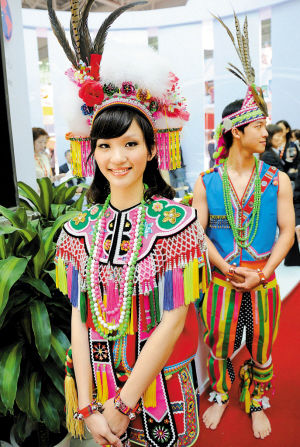7. sweet cakes: sweet cakes refer to rice cakes, which are indispensable when people in Taiwan offer sacrifices to deities and ancestors at Spring Festival.
8. rice dumplings: Habitually, families of the deceased neither steam rice cakes, nor present rice dumplings.
9. ducks: "Yuerou" means meat which women eat in the first month after their delivery.
Ethnic minorities
Taiwan has its heritage of ethnic minorities, all of whom live in remote valleys and along the rocky slopes of the central mountain range. They once occupied the entire island, but today are a small minority of about 350,000 people, or less than 2% of the majority Chinese population. They are Taiwan's original people, or aboriginals.

Out of the 375,000 ethnic minorities, only nine conspicuous tribes still dominate Taiwan. These tribes are Ami, Atayal, Bunun, Paiwan, Puyuma, Rukai, Saisiyat, Tsao, and Yami.
1. Ami: Flaunting more than 150,000 members, Ami, the largest ethnic group, populates the scenic mountains and valleys near Hualien on the east coast.
Amis are primarily farmers. Each harvest (end July, beginning August) is welcomed with an array of traditional dance forms, music, costumes, and customs.
2. Atayal:The Atayal tribe inhabits the lush valleys of Wulai, about an hour's drive from Taipei. Due to their proximity to Taipei, they are more neoteric in their thinking and most of them are involved in the tourism field.
3. Paiwan:The Paiwan is unique for its worshipping of the 'hundred-pacer' snake. It is believed that the snake (named so because of its deadly capabilities) can kill its victims before they can run 100 steps.
Paiwans are experts in wood-carving, making totems, doors, eaves, beams, smoking pipes, and other showpieces. They also weave, sculpt stones, and make beadwork using ancient designs and techniques.
4. Rukai: The Rukai's main trait is agriculture. They prefer remote, inaccessible cliff-side homes. They do not mind having neighbors 10 hours away.
Rukai people regard traditions with high esteem. The tunics and robes that they wear on special occasions are intricately embroidered in black and silver and represent their affinity to tradition.
An interesting spectacle of Rukai competence is in their 'swing contest'. Future brides mount an enormous swing, with their legs fettered to prevent flailing. Then brawny and strong tribesmen in ceremonial attires swing the ladies as high as they can, and later the girls are carried off their swings and dropped into the arms of their most faithful admirers.
5. Puyuna: Like the Rukai, the Puyuma also prefer to live on the foothills of the central mountain range, near Taitung. They share almost mutual traditions with the Rukai and sporadically venture into the city outskirts for major festivals and swing contests.
